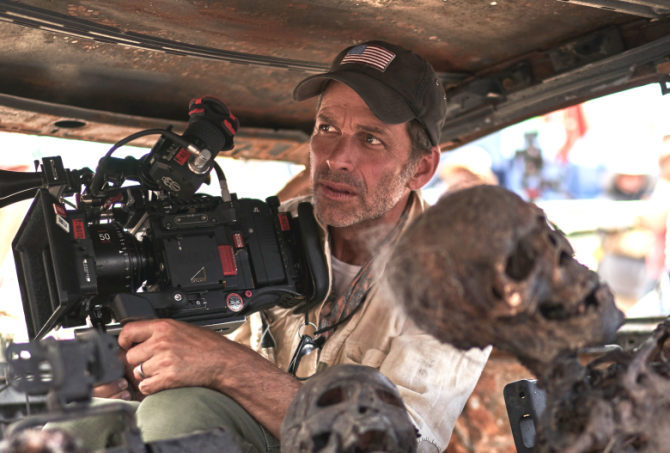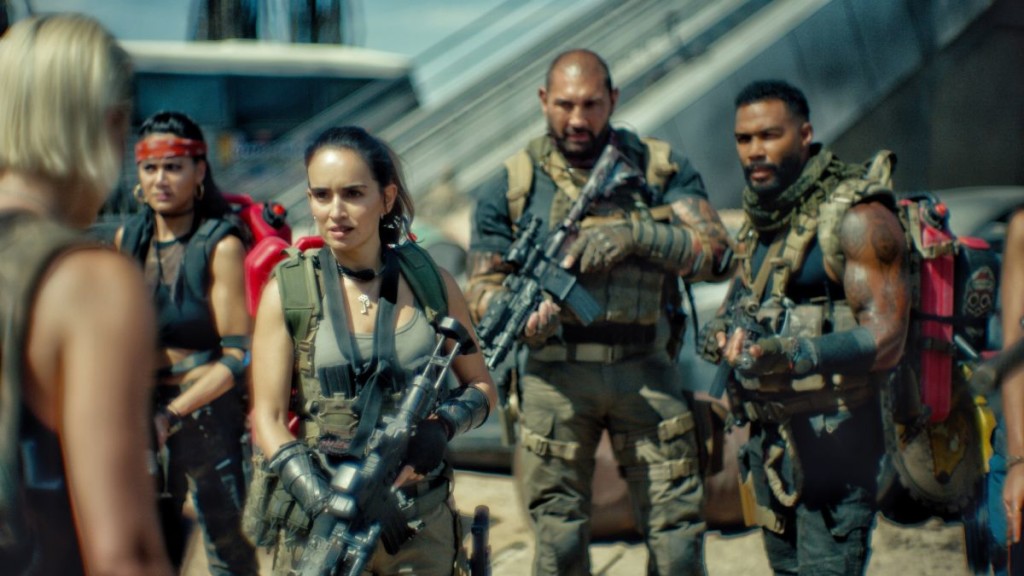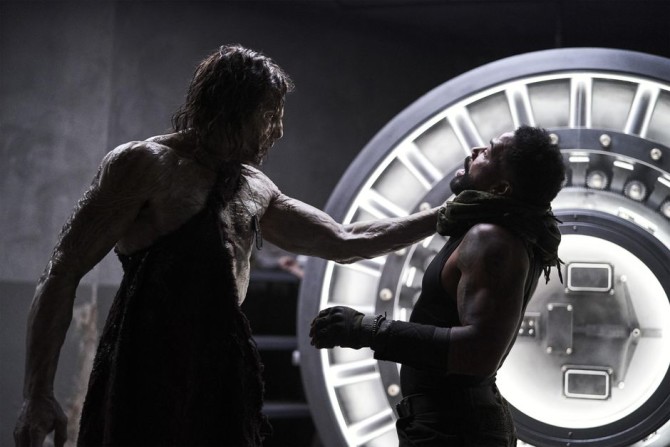Genre: Action/Horror/Zombie
Premise: A team of misfits is tasked with going into a zombie-infested Las Vegas to retrieve 200 million dollars locked in a safe in the basement of a casino.
About: Army of the Dead is one of Netflix’s biggest releases ever and mega-director Zack Snyder’s follow-up to Justice League. Co-writer Joby Harold started his writing career with the 2007 Hayden Christensen film, Awake. He would later write King Arthur: Legend of the Sword. Co-writer Shay Hatten was just 26 years old when he wrote this and even younger when he wrote John Wick 3.
Writer: Story by Zack Snyder. Screenplay by Shay Hatten and Joby Harold
Details: 2 hours and 20 minutes long
One of the most frustrating things when watching a movie is being out of tune with the director. A director is not unlike someone you meet at a party. Sometimes you gel with a person – you like their sense of humor, you have similar interests, you like their opinions on things – and other times you get stuck with someone who feels like they live on a different planet from you – they bring up boring topics, they have an odd sense of humor, they rave about TV shows you wouldn’t touch with a ten foot pole.
That’s not to say I’m the “right” guy at the party and the other person is “wrong.” It just means we see the world differently. That’s how I feel whenever I watch a Zack Snyder movie. Every choice he makes feels bizarre to me.
For example, one of the things he kept doing in this movie was not light his actors. There’s a specific reason why this is irritating. I want to see the characters’ faces! I want to see every little nuance, especially if the scene is an emotional one.
There’s a scene about 30 minutes into the movie where Dave Bautista is talking to another character late in the day. Snyder adjusts the camera to focus on the sunset and not on the actors to the point where it’s very hard to make out Bautista’s expressions. It’s annoying and actively works to hurt the scene.
And that doesn’t even touch on the bigger problems I have with Snyder, such as his over-reliance on melodrama. His over-reliance on slow motion and dramatic score. His pretentiousness. This is a man who wanted to not only do a four hour Justice League cut, but reframe it in 4×3 (television) format for no reason, then make the entire thing black and white. That’s the trifecta of pretentiousness right there.
The best thing about Army of the Dead is its setup. After a military caravan carrying top secret cargo crashes in the desert, the cargo, which turns out to be zombies, overwhelms the caravan before hightailing it to nearby Vegas, where they infect the entire city. The military walls up the city to keep the zombies inside and schedules a tactical nuclear strike in a week.
A group of mercenaries, led by former soldier Scott Ward (Dave Bautista), is then tasked by a rich Japanese man to get inside the city, head to a casino, and break into its safe, where 200 million in cash is sitting. Scott recruits all his old buddies, some above board, most of them below it, and off they go into a seriously zombie infested Vegas.
When they get there, they realize there’s a sort-of “zombie hierarchy.” There are regular zombies and then there are “Alphas.” The alphas seem to be able to communicate and plan. They also have super strength, which I suppose is why the military was interested in them. At the very top of the food chain are the King and Queen zombie. Do with that what you will.
Long story short, we eventually learn that the Japanese businessman never wanted the money. He wanted the queen zombie’s head. I think because it would give him access to the military’s secret sauce of turning people into killing machines. Unfortunately, the group falls apart quickly, divided off into their own little sub-groups, where they get picked off one by one. In the end, the original goal goes out the window and the only thing that matters is getting out of Vegas alive.
This is a cool concept right?
I love the idea of mixing a zombie movie with a heist movie. The exotic location of Vegas is a perfect backdrop for a zombie flick. The task actually makes sense for once in these movies. Of course there would still be money in Vegas. Of course people would try and get their hands on it before the city blew up. Conceptually, this is strong stuff.
So why was the movie so bad?
There are a few reasons.
The biggest is that, under no circumstances, can your hero ever be the 6th or 7th most memorable character in your movie. I’m not sure what the writers were doing with Scott Ward. I think they wanted to make him a big softie. Touchy-feely type. Whatever led to that choice hurt this movie bad. Because Ward barely says anything. When he does speak, it’s soft and mumbled. He’s not particularly active. In many scenes, he drifts into the background.
I’ll give you an example. There’s a big scene when they first get into Vegas where their guide surprises them by “feeding” one of the assholes on their team to the alphas. She says this is necessary if they want permission to run around the city. It’s a long drawn out scene where she shoots the asshole, they wait for the alphas to come, and, finally, they come drag the asshole away.
During this ENTIRE SCENE, Scott Ward says nothing. During this ENTIRE SCENE, Scott Ward does nothing. Don’t you think the star of the movie – actually, scratch that – the LEADER OF THE GROUP should have an opinion about someone offering up one of their men to the zombies without his permission??? That moment solidified Scott Ward as an empty leader and weak character. I guarantee nobody who watched this cared about him after that moment.
The other big issue is the zombies. This critique is a little more complex, though. I’m the first one who will tell you that if you’re going to write a zombie screenplay, you need to evolve the mythology. So I get why we have alphas. I get why we have zombies who are stronger.
On the other hand, you have to understand why the mythology of anything has worked for so long and make sure that any changes you make don’t undermine that mythology. The reason zombies are terrifying is because they don’t reason. They are mindless. There is no horror situation more visceral than a horde of zombies closing in on a character with nowhere left to run. You’ve eliminated all that in one fell swoop with these intelligent scheming zombies.
Late in the script, we get this scene where one of the tougher soldiers gets cornered in a room with an “Alpha” zombie. The alpha decides… ehhh, I don’t want to bite you. I want to FIGHT YOU. So him and the alpha zombie fight. Is this a fresh new way to deal with zombies? Yes. Does it make the zombie mythology better? Not even a little bit. Once you have a strong intelligent zombie who wants to fight you, you no longer have a zombie. You have a human. You can put as much makeup on him as you want. But he’s the same as a human.
Even when Army of the Dead occasionally locked into a good moment, it would screw it up. There’s a potentially great scene where the team enters a hallway that’s packed with zombies. But the zombies are all frozen for some reason. Someone says, “Oh yeah, they’re hibernating. We can walk through them just don’t make any sudden movements.”
Having to walk through a packed crowd of sleeping zombies who could wake up at the slightest noise is a great scene idea. The problem is, they didn’t set it up. You need to set stuff like this up beforehand for it to fire on all cylinders. You needed a scene 15 minutes earlier where they’re walking through a room and there are a couple of zombies not moving and THAT’S when someone says, “Oh yeah. They’re hibernating.” This establishes the hibernating premise so it’s an official part of the mythology.
That way, 15 minutes later, when they see the crowd of still zombies, the audience already knows what’s going on. They know this is a group of hibernating zombies. They know this is going to be terrifying getting through them. And it all feels more natural because the rules have been established. Telling us all of this at once creates a “making it up as we go along” feel to the storytelling that turns audiences off.
Despite half its running time being in slow motion, the movie did have a few nice moments. (Spoilers) One of my favorites was when Scott had this really intense heartfelt conversation with his ex-girlfriend and in the very next moment, a zombie walks over and, while the ex was turned away from Scott, grabbed her head and spun it around, cracking it, so that it finished facing Scott. I certainly didn’t expect that to happen!
And there were a few other funny moments with the crew. But, all in all, Snyder’s incessant indulgences as a filmmaker mixed with superhero zombies and an inability to spot a protagonist that needed a complete reimagining, doomed this movie. Which is too bad. I was hoping to have fun with this one.
[ ] What the hell did I just watch?
[x] wasn’t for me
[ ] worth the stream
[ ] impressive
[ ] genius
What I learned: The worst thing you can do in these movies is have the audience know exactly who’s going to survive. Kill off people they don’t expect and you will have the audience on guard. Army of the Dead succeeded in this department. I was positive the ex-girlfriend was going to live. And the second she didn’t, I perked up. Because I realized I was no longer going to be able to predict what happened next.




